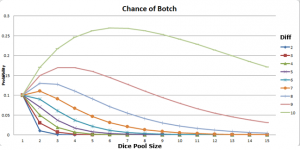With all of the systems consideration and potential revision going on for V20, the matter of dice pools and success statistics has come up. It’s something that the Storyteller System has always had an acknowledgedly side-eyed relationship with, but this was certainly a worthwhile time to delve back into the math. So… let’s.
At a difficulty of six, which is the default target number for the World of Darkness, the statistics are nice and safe and sane. The bigger your dice pool, the better you stand to do, and the less likely you are to really go all screwy with the results. Here, check it out. Here’s the statistical progression for increasing dice pools with a difficulty of six. Nice and clean.
(Big thanks to Kaitlyn Burnell, whose time I borrowed from her regular team tasks to hash out the prob chart.)
Where things go a little awry are with difficulty numbers of seven or more. Now, the regular progression of success inclines nicely for difficulties of seven or more when dice pools increase, as it should. But looking at a different set of statistics — specifically whether you’ll botch or not — the figures get a little screwy. Here, check it out.
At difficulty 7, you’re a tiny bit more likely to botch with two dice in your pool than you are with just one. That is, weirdly, the better you are, the more likely you are to have a gross failure in terms of the rules. The increased difference isn’t huge, but it’s worth noting, and, frankly, it’s going to be relevant at some point. It’s even more pronounced at a difficulty of 8, where pools of two, three, and four dice are more likely to hit botches than single dice. At difficulty 9, dice pools of two to six dice are exceptionally anomalous, and even dice pools of seven to nine dice are more likely to hit a botch than a single die is.
Also, look at that progression for difficulty 10. With a dice pool of six or seven dice, at difficulty 10, you have an almost 30 percent chance of epically shitting the bed. Not just failing, mind you, but botching. If the difficulty is 10, if you take six or seven dice into the action, you have almost a 30 percent chance of severing your own head, staking your girlfriend with a piece of rebar, joining Nickelback, or paying $35,000 for a 1981 Chevy Camaro Berlinetta.
Difficulty 10: Avoid it. (I’ve added a section to the rules chapter explicity stating the warning to readers, so we’re not trying to hide this.)
Now, what does all of this mean? Well, we have two courses of action. We can change the system so that the curve is more friendly to mid- to high-range dice pools at difficulties above seven. From a purely rational perspective, this is the thing to do.
However, I’ve seen a lot of commentary on the matter like these, over at RPG.net:
“Man, half the fun in oWoD was the crazy botches. It’s like playing Snatch with Vampires.” (Arnino Storm)
and
“Using them as an excuse to interject something else into the action or story made for a better game. Botches gunshots might not affect the battle but set off the fire sprinklers meaning everybody is now wet and the mortal police and firemen will be there in 5 to 10 minutes. Botched hunting roll might mean that they succeed but spend the night tripping on fey blood or have become noticed by somebody.” (painandgreed)
And you know what? I agree with these. While I will certainly stop far short of saying that your reward for a high degree of competence (dice pool) versus problematic situation (difficulty) is the greater chance of sewing your car keys into the ghoul’s abdominal cavity, I will say that they are both narrative goldmines, and they’re true to the fluky, weird, and cosmically karmic nature of classic tabletop Vampire storytelling.

